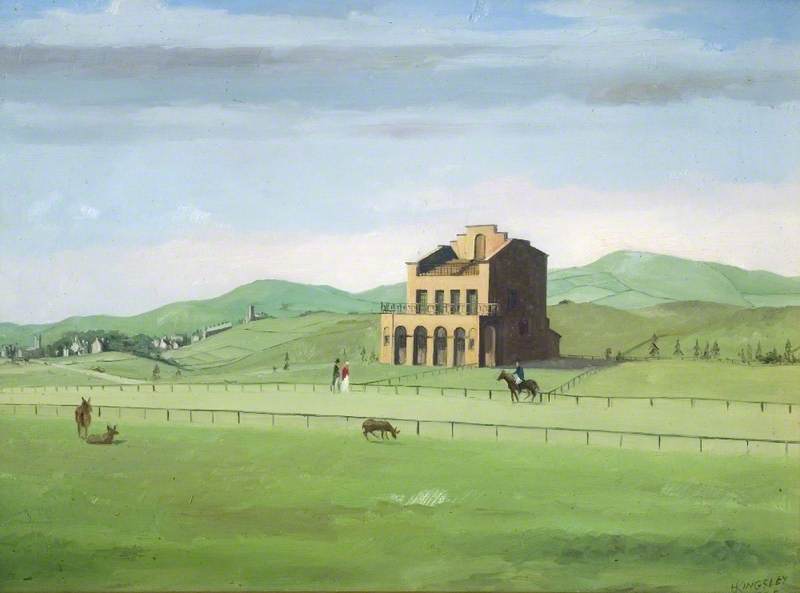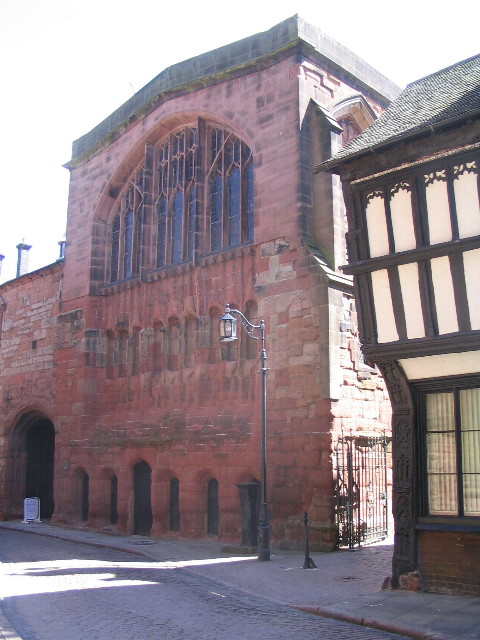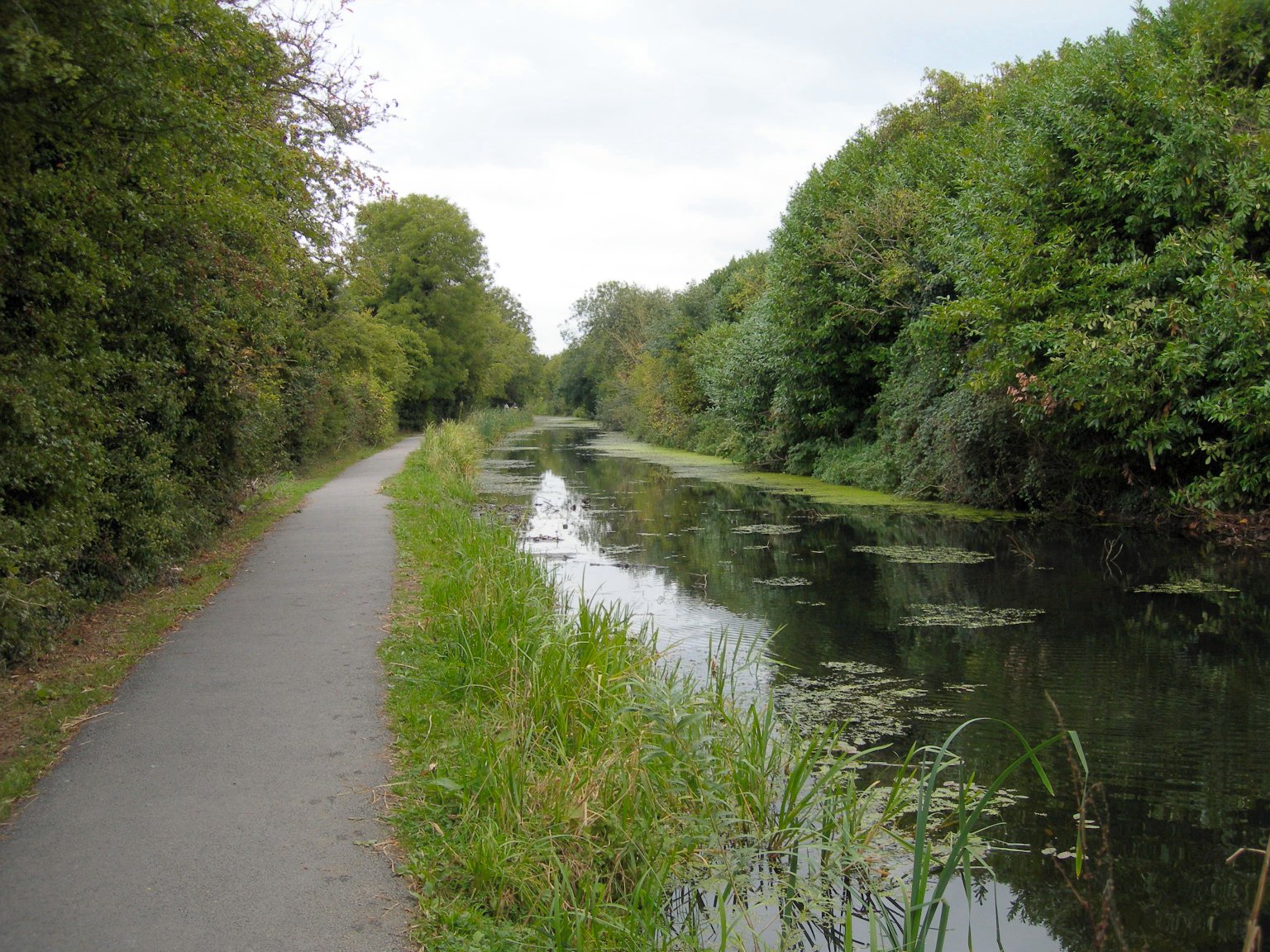|
George Kitchen
George Kitchen (1876 – after 1969) was an English footballer who played as a goalkeeper for various clubs in the early part of the twentieth century, including long spells at Everton and West Ham United. Football career Born in Fairfield, Derbyshire, Kitchen was an outstanding sportsman and became a professional golfer at the age of 14. He also played cricket and for a time worked as a coach at Dulwich College. He eventually decided to concentrate on football and, after a period with his local club, Buxton, playing in The Combination, he joined Stockport County, then playing in the Lancashire League. After a year at Stockport, made the move up to the Football League, joining Everton in 1898 as cover for Scottish international, Willie Muir. Kitchen made his debut on 14 January 1899, in a 2–0 victory over Preston North End. It was not until October 1901 that he became Everton's first-choice custodian, following Muir's departure, helping Everton to reach the runners-up posi ... [...More Info...] [...Related Items...] OR: [Wikipedia] [Google] [Baidu] |
Fairfield, Derbyshire
Fairfield is a district of Buxton in the High Peak of Derbyshire. The historic medieval village of Fairfield was centred around a village green (known as 'the Green'). Location Fairfield is located on the A6 road half a mile to the north east of Buxton's town centre, 340m above sea level. Fairfield is at the head of the narrow dry gorge of Cunningdale, which is part of the Wye Valley Site of Special Scientific Interest (SSSI). History The name Fairfield derives from the Germanic meaning 'fair open land', because of its good volcanic soil for pasture. Cistercian monks and Benedictine nuns founded monastic granges at Fairfield in the early 1200s AD (Nunsfield Farm still exists). In the 13th century Fairfield (being north of the River Wye) was within the Royal Forest of Peak, a hunting ground for the king. Fairfield was a chapelry in the parish of Hope (whereas Buxton was in the Bakewell parish). Fairfield and Buxton shared a medieval corn mill on the Wye in Mill Dale, where ... [...More Info...] [...Related Items...] OR: [Wikipedia] [Google] [Baidu] |
Football League First Division
The Football League First Division was a division of the Football League in England from 1888 until 2004. It was the top division in the English football league system from the season 1888–89 until 1991–92, a century in which the First Division's winning club became English men's football champions. The First Division contained between 12 and 24 clubs, playing each other home and away in a double round robin. The competition was based on two points for a win from 1888 until the increase to three points for a win in 1981. After the creation of the Premier League, the name First Division was given to the second-tier division (from 1992). The name ceased to exist after the 2003–04 First Division season. The division was rebranded as the Football League Championship (now EFL Championship). History The Football League was founded in 1888 by Aston Villa director William McGregor. It originally consisted of a single division of 12 clubs (Accrington, Aston Villa, B ... [...More Info...] [...Related Items...] OR: [Wikipedia] [Google] [Baidu] |
Ernie Steventon
Ernest Steventon (1888 – 23 November 1950) was an English professional footballer who played as a goalkeeper for Southampton in the years prior to World War I. Football career Steventon was born in Walsall, Staffordshire (now in the West Midlands) and after a spell with Walsall, then playing in the Birmingham & District League, he moved to local rivals Wednesbury Old Athletic. He soon acquired a reputation as "''the best young goalkeeper in the Black Country''", which brought him to the attention of Southampton of the Southern League. Steventon joined the "Saints" in May 1913, aged 24, and was initially in the shadow of veteran goalkeeper George Kitchen. He made his debut on 8 November 1913, taking over from Kitchen after a run of four defeats, in a 2–2 draw with Crystal Palace at The Dell. Once he had established himself in the side, his agility and "safe pair of hands" quickly made the 'keeper's jersey his own, with Kitchen only making two further appearances. Stev ... [...More Info...] [...Related Items...] OR: [Wikipedia] [Google] [Baidu] |
Coventry City F
Coventry ( or ) is a City status in the United Kingdom, city in the West Midlands (county), West Midlands, England. It is on the River Sherbourne. Coventry has been a large settlement for centuries, although it was not founded and given its city status until the Middle Ages. The city is governed by Coventry City Council. Historic counties of England, Formerly part of Warwickshire until 1451, Coventry had a population of 345,328 at the 2021 census, making it the tenth largest city in England and the 12th largest in the United Kingdom. It is the second largest city in the West Midlands (region), West Midlands region, after Birmingham, from which it is separated by an area of Green belt (United Kingdom), green belt known as the Meriden Gap, and the third largest in the wider Midlands after Birmingham and Leicester. The city is part of a larger conurbation known as the Coventry and Bedworth Urban Area, which in 2021 had a population of 389,603. Coventry is east-south-east of ... [...More Info...] [...Related Items...] OR: [Wikipedia] [Google] [Baidu] |
William Knight (footballer)
William Knight was an English professional footballer who played as a goalkeeper for Southampton in the years prior to World War I. Football career Knight was born in Toogates, Tamworth and began his career at Walsall, before being spotted by Aston Villa in 1907. He joined Villa as an amateur and spent some time with their nursery club, Stourbridge. In 1911, he had a trial with Southampton of the Southern League, in which he "''shaped up well''" and, much against the wishes of the Villa directors, he moved to the south coast in May 1911. He made his debut for the "Saints" when he replaced Arthur Brown for the match at Luton Town on 18 November 1911. At first he was an "''agile and vigilant custodian''" whose only fault was that he was "''inclined to come off his line too hurriedly''". He became the first-choice keeper for the rest of the 1911–12 season, but in October 1912 he lost his place to the veteran George Kitchen George Kitchen (1876 – after 1969) was an Englis ... [...More Info...] [...Related Items...] OR: [Wikipedia] [Google] [Baidu] |
Ernest Arnfield
Ernest Arnfield (25 December 1853 – 8 August 1945) was an English football manager who was secretary/manager of Southampton F.C. from 1897 to 1911, and again from 1912 to 1919. Arnfield was born in Mellor, Derbyshire. He died in Southampton, aged 91.''England & Wales, National Probate Calendar (Index of Wills and Administrations), 1858-1966, 1973-1995'' Honours Southampton * Southern League champions: 1897–98, 1898–99, 1900–01, 1902–03 and 1903–04 *FA Cup finalists: 1900 and 1902 Events January * January 1 ** The Nurses Registration Act 1901 comes into effect in New Zealand, making it the first country in the world to require state registration of nurses. On January 10, Ellen Dougherty becomes the world's ... References Southampton F.C. managers 1853 births 1945 deaths Southern Football League managers People from Mellor, Greater Manchester Sportspeople from Derbyshire {{england-footy-manager-stub ... [...More Info...] [...Related Items...] OR: [Wikipedia] [Google] [Baidu] |
Jimmy McIntyre
James Alfred McIntyre (31 October 1881 – 1954) was an English footballer who became manager at Southampton, Coventry City and Fulham. Playing career McIntyre was born in Wednesbury, Staffordshire. He was a journeyman player of some repute, playing as an inside-forward, and had spells with West Midlands teams Witton Albion, Darlaston Town and Wednesbury Old Athletic. In 1901, he joined Walsall (his home-town club), before spending the 1902–03 season in the First Division at Notts County. He then had a spell at Reading before joining Coventry City as a player in 1905, where he scored hat-tricks in his second and third games for the club. After his playing days were over he worked at the Humber car factory in Coventry and spent one season refereeing in the Coventry & North Warwickshire League, also turning out for Dudley & Bournbrook, before returning to Coventry City as an assistant trainer in 1907. Within one season he was promoted to chief trainer and his initial as ... [...More Info...] [...Related Items...] OR: [Wikipedia] [Google] [Baidu] |
John Geggus
John Geggus (26 November 1889 — 2 December 1951) was a footballer who played as goalkeeper for Custom House, West Ham United and Gravesend United. Club career Geggus played 31 times for West Ham United in the Southern League, keeping nine clean sheets in total. Geggus' departure from West Ham was marred by his refusal to continue the game against Leyton on 9 April 1912 after being on the receiving end of disparaging comments from the West Ham support. Geggus' place was taken by Joseph Hughes and Geggus played only once more for West Ham. Personal life Geggus is the paternal grandfather of Cockney Rejects Cockney Rejects are an English punk rock band that formed in the East End of London in 1978. Their 1980 song "Oi, Oi, Oi" was the inspiration for the name of the Oi! music genre. The band members are supporters of West Ham United, and pay tri ... vocalist Jeff Turner. References 1889 births 1951 deaths Footballers from the London Borough of Newham People fr ... [...More Info...] [...Related Items...] OR: [Wikipedia] [Google] [Baidu] |
Swindon Town F
Swindon () is a town and unitary authority with borough status in Wiltshire, England. As of the 2021 Census, the population of Swindon was 201,669, making it the largest town in the county. The Swindon unitary authority area had a population of 233,410 as of 2021. Located in South West England, the town lies between Bristol, 35 miles (56 kilometres) to its west, and Reading, equidistant to its east. Recorded in the 1086 Domesday Book as ''Suindune'', it was a small market town until the mid-19th century, when it was selected as the principal site for the Great Western Railway's repair and maintenance works, leading to a marked increase in its population. The new town constructed for the railway workers produced forward-looking amenities such as the UK’s first lending library and a ‘cradle-to-grave' health care centre that was later used as a blueprint for the NHS. After the Second World War, the town expanded dramatically again, as industry and people moved out from Londo ... [...More Info...] [...Related Items...] OR: [Wikipedia] [Google] [Baidu] |
Matt Kingsley
Matthew Kingsley (30 September 1874 – 27 March 1960) was a association football, footballer who played as Goalkeeper (association football), goalkeeper for Darwen F.C. (1870), Darwen, Newcastle United F.C., Newcastle United, West Ham United F.C., West Ham United, Queens Park Rangers F.C., Queens Park Rangers, Barrow A.F.C., Barrow and Rochdale A.F.C., Rochdale. Club career In all, Kingsley made 180 appearances in six First Division seasons at Newcastle United F.C., Newcastle United and nine appearances in the FA Cup, which included an infamous cup exit at Southampton F.C., Southampton in 1900. Kingsley lost his place to Jimmy Lawrence midway through the 1903–04 season and moved on to West Ham United F.C., West Ham United. Kingsley departed West Ham after kicking former West Ham player Herbert Lyon in a game against Brighton & Hove Albion F.C., Brighton & Hove Albion in March 1905, causing a crowd invasion and a near riot. International career In 1900-01 in English footbal ... [...More Info...] [...Related Items...] OR: [Wikipedia] [Google] [Baidu] |
Southern Football League
The Southern League is a men's Association football, football competition featuring semi-professional clubs from the Southern England, South and The Midlands, Midlands of England. Together with the Isthmian League and the Northern Premier League it forms levels seven and eight of the English football league system#The system, English football league system. The structure of the Southern League has changed several times since its formation in 1894, and currently there are 84 clubs which are divided into four divisions. The Central and South Divisions are at step 3 of the National League System (NLS), and are feeder divisions, mainly to the National League South but also to the National League North. Feeding the Premier Divisions are two regional divisions, Division One Central and Division One South, which are at step 4 of the NLS. These divisions are in turn fed by various regional leagues. The league has its administrative head office at Eastgate House in the City of Gloucest ... [...More Info...] [...Related Items...] OR: [Wikipedia] [Google] [Baidu] |
Reserve Team
In sports, a reserve team is a team composed of players under contract to a club but who do not normally play in matches for the first team. Reserve teams often include back-up players from the first team, young players who need playing time to improve their skills, as well as members of the first team recovering from injury. In some countries, reserve or development teams compete in entirely separate competitions from first teams, while some countries allow reserve teams or farm teams to compete in the same league system as their club's first team, although usually in separate divisions. In association football Reserve teams usually consist of a combination of emerging youth players and first-team squad players. These teams are distinct from a club's youth team, which usually consists of players under a certain age and plays in an age-specific league. In England, Argentina and the United States the term ''reserve'' is commonly used to describe these teams. In Germany and Austria ... [...More Info...] [...Related Items...] OR: [Wikipedia] [Google] [Baidu] |


